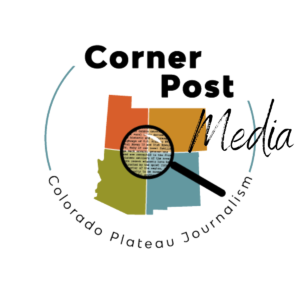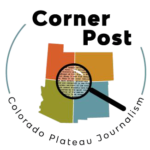
About Us
Who We Are
Corner Post Staff
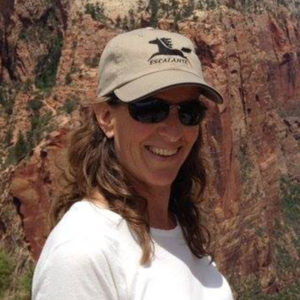
Erica Walz – Executive Director
Erica Walz held dual careers: in nonprofit management on both coasts, and in publishing, as the publisher of The Wayne & Garfield County Insider, a community newspaper in Escalante, Utah. She merges these experiences in her new role as the executive director of Corner Post. She currently serves on the boards of Utah Press Association and Utah Humanities.

Emily Leach – Program Director
Emily Leach first came to the West in 2011, when she joined the Utah Conservation Corps. She worked her way from crew member, to crew leader, to field boss and spent much of her time in the program as a sawyer, removing Russian Olive from along the Escalante River Watershed—a Grand Staircase Escalante Partners project.
After her stint with the Utah Conservation Corps, she decided that Escalante is where she wanted to call home and is now the Layout/ Design Editor for The Wayne and County Insider and started her position as Program Director with Corner Post in March of 2020.
She enjoys hiking, photography, and snuggling baby farm animals.
Corner Post Board of Directors
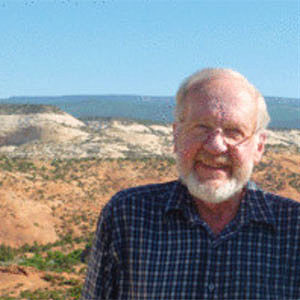
Dave Conine, President
In late 2023 Dave retired following a 50+ year career in planning, economic
development, and policy analysis for state, local and federal agencies as well as tribal
government and nonprofit organizations. He also taught college courses in earth
science, meteorology, and cartography. He served as the Obama Administration’s
Director of USDA Rural Development for Utah.
Dave cites Jane Jacob’s book The Death and Life of Great American Cities published in
1961 as a major influence on his own community planning philosophy. His hope for the
future is largely based on preserving the five pillars of civilization Jane Jacobs identified
in Dark Age Ahead which she published in 2004.
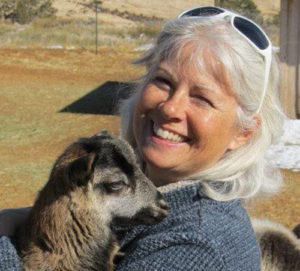
Peg Smith, Vice-President
Peg (Margaret) Smith has been actively involved in the Boulder, Utah community since moving there in 2003. She helped found and later directed a community nonprofit, served for 19 years as clerk for Boulder’s Planning Commission, and remains engaged in ongoing voter registration/education efforts.
Although she graduated from a midwestern university with a journalism degree, she spent her career, in Utah, as a technical writer/product information manager within the tech industry, and later as an independent contractor. Peg now gets to exercise her journalistic muscles periodically with bi-weekly reporting on Garfield County Commission meetings and other local concerns.
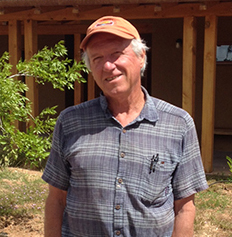
Mark Austin, Secretary / Treasurer
Mark Austin came to Utah in 1971 studying art and architecture at the University of Utah. While traveling on time off from studies he became enamored with the landscape of Southern Utah and moved to southern Utah in 1974.
Mark began working construction while developing further appreciation of the wild lands of southern Utah and became involved in conservation efforts to protect and preserve Utah’s vast unspoiled lands. He began developing projects that both protect the aesthetic and environmental values of the land while providing livable wages to his employees. He is currently partnered with his brother-in-law in Austin-Witzdam Builders, focused on new home construction in Escalante and Boulder, Utah. He works to promote the concept of community and economic development into environmental conservation.
Corner Post is an independent non-profit media organization that produces journalism covering the Colorado Plateau. We support reporting and publish stories that are important to the people and to the unique landscapes of this region.
The Colorado Plateau is shaped by aridity, irrigated agriculture, extensive public lands, world-re-nowned rugged geography, and pioneer, Native American and ancient settlement underpinnings to our culture. Sparsely populated and underserved by in-depth reporting, the region is rich with stories to be told about our ongoing evolution within—and relationship to—this outstanding natural area.
Corner Post follows the Code of Ethics set forth by the Society for Professional Journalists.
Ethical journalism should be accurate and fair. Journalists should be honest and courageous in gathering, reporting and interpreting information. Journalists should:
– Take responsibility for the accuracy of their work. Verify information before releasing it. Use original sources whenever possible
– Remember that neither speed nor format excuses inaccuracy.
– Provide context. Take special care not to misrepresent or oversimplify in promoting, previewing or summarizing a story.
– Gather, update and correct information throughout the life of a news story.
– Be cautious when making promises, but keep the promises they make.
– Identify sources clearly. The public is entitled to as much information as possible to judge the reliability and motivations of sources.
– Consider sources’ motives before promising anonymity. Reserve anonymity for sources who may face danger, retribution or other harm, and have information that cannot be obtained elsewhere. Explain why anonymity was granted.
– Diligently seek subjects of news coverage to allow them to respond to criticism or allegations of wrongdoing.
– Avoid undercover or other surreptitious methods of gathering information unless traditional, open methods will not yield information vital to the public.
– Be vigilant and courageous about holding those with power accountable. Give voice to the voiceless.
– Support the open and civil exchange of views, even views they find repugnant.
– Recognize a special obligation to serve as watchdogs over public affairs and government. Seek to ensure that the public’s business is conducted in the open, and that public records are open to all.
– Provide access to source material when it is relevant and appropriate.
– Boldly tell the story of the diversity and magnitude of the human experience. Seek sources whose voices we seldom hear.
– Avoid stereotyping. Journalists should examine the ways their values and experiences may shape their reporting.
– Label advocacy and commentary.
– Never deliberately distort facts or context, including visual information. Clearly label illustrations and re-enactments.
– Never plagiarize. Always attribute.
Minimize Harm
Ethical journalism treats sources, subjects, colleagues and members of the public as human beings deserving of respect. Journalists should:
– Balance the public’s need for information against potential harm or discomfort. Pursuit of the news is not a license for arrogance or undue intrusiveness.
– Show compassion for those who may be affected by news coverage. Use heightened sensitivity when dealing with juveniles, victims of sex crimes, and sources or subjects who are inexperienced or unable to give consent. Consider cultural differences in approach and treatment.
– Recognize that legal access to information differs from an ethical justification to publish or broadcast.
– Realize that private people have a greater right to control information about themselves than public figures and others who seek power, influence or attention. Weigh the consequences of publishing or broadcasting personal information.
– Avoid pandering to lurid curiosity, even if others do.
– Balance a suspect’s right to a fair trial with the public’s right to know. Consider the implications of identifying criminal suspects before they face legal charges.
– Consider the long-term implications of the extended reach and permanence of publication. Provide updated and more complete information as appropriate.
Act Independently
The highest and primary obligation of ethical journalism is to serve the public. Journalists should:
– Avoid conflicts of interest, real or perceived. Disclose unavoidable conflicts.
– Refuse gifts, favors, fees, free travel and special treatment, and avoid political and other outside activities that may compromise integrity or impartiality, or may damage credibility.
– Be wary of sources offering information for favors or money; do not pay for access to news. Identify content provided by outside sources, whether paid or not.
– Deny favored treatment to advertisers, donors or any other special interests, and resist internal and external pressure to influence coverage.
– Distinguish news from advertising and shun hybrids that blur the lines between the two. Prominently label sponsored content.
Be Accountable and Transparent
Ethical journalism means taking responsibility for one’s work and explaining one’s decisions to the public. Journalists should:
– Explain ethical choices and processes to audiences. Encourage a civil dialogue with the public about journalistic practices, coverage and news content.
– Respond quickly to questions about accuracy, clarity and fairness.
– Acknowledge mistakes and correct them promptly and prominently. Explain corrections and clarifications carefully and clearly.
– Expose unethical conduct in journalism, including within their organizations.
– Abide by the same high standards they expect of others.
The CP Code of Ethics is a statement of abiding principles supported by additional explanations and position papers that address changing jour-nalistic practices. It is not a set of rules, rather a guide that encourages all who engage in journalism to take responsibility for the information they provide, regardless of medium. The code should be read as a whole; individual principles should not be taken out of context. It is not, nor can it be under the First Amendment, legally enforceable.
Corner Post subscribes to standards of editorial independence adopted by the Institute for Nonprofit News:
Corner Post retains full authority over editorial content to protect the best journalistic and business interests of our organization. We maintain a firewall between news coverage decisions and sources of all revenue. Acceptance of financial support does not constitute implied or actual endorsement of donors or their products, services or opinions.
Corner Post accepts gifts, grants and sponsorships from individuals and organizations for the general support of our activities, but our news judgments are made independently and not on the basis of donor support.
Corner Post may consider donations to support the coverage of particular topics, but our organization maintains editorial control of the coverage. We will cede no right of review or influence of editorial content, nor of unauthorized distribution of editorial content.
Corner Post is committed to transparency in every aspect of funding our organization.
Corner Post will make public all donors. We will accept anonymous donations for general support only if it is clear that sufficient safeguards have been put into place that the expenditure of that donation is made independently by our organization. We will not accept donations from government entities, political parties, elected officials or candidates actively seeking public office. We will not accept donations from sources who, deemed by our board of directors, present a conflict of interest with our work or compromise our independence.
We are a 501(c)(3) non-profit funded solely by grants and tax-deductible donations. For a list of Corner Post donors, check out our Donors page.
Corner Post does not and shall not discriminate on the basis of race, color, religion (creed), gender, gender expression, age, national origin (ancestry), disability, marital status, sexual orientation, or military status, in any of its activities or operations. These activities
include, but are not limited to, the appointment to and termination from its Board of Directors, hiring and firing of staff or contractors, selection of volunteers, selection of vendors, and providing of services.
Corner Post is an equal opportunity employer. We shall not discriminate and will not discriminate in employment, recruitment, Board membership, advertisements for employment, compensation, termination, upgrading, promotions, and other conditions of employment against any employee or job applicant on the basis of race, color, religion (creed), gender, gender expression, age, national origin (ancestry), disability, marital status, sexual orientation, or military status, or for any other discriminatory reason.
Corner Post’s work is available under a Creative Commons License and under our guidelines:
- You are free to republish the text of this article both online and in print (Please note that images are not included in this blanket licence as in most cases we are not the copyright owner) but:
- you can’t edit our material, except to reflect relative changes in time, location and editorial style and ensure that you attribute the author, their institute, and mention that the article was originally published on Corner Post;
- if you’re republishing online, you have to link to us and include all of the links in the story;
- you can’t sell our material separately;
- it’s fine to put our stories on pages with ads, but not ads specifically sold against our stories;
- you can’t republish our material wholesale or automatically—you need to select stories to be republished individually;
- you have to credit us, ideally in the byline; we prefer “Author Name, Corner Post,” with a link to our homepage or the article; and
- you have to tag our work with an editor’s note, as in “This article was paid for, developed, and originally published by Corner Post. Corner Post is an independent, nonprofit news organization. See cornerpost.org for more.” Please, include a link to our site and our logo, which can be found here.



